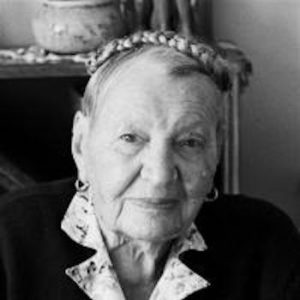
Ray Alexander Simons
*Ray Alexander Simons was born on this date in 1913. She was a white Jewish South African communist and anti-apartheid activist.
Simons was born Rachel Ester Alexandrowich in Latvia. She was one of six children from Simka Simon and Dobe Alexandrowich. Her father taught her Russian and German languages and mathematics. He also ran a cheder where the Jewish boys studied Talmud. She lived in a wealthy household full of books, which exposed her to socialist and communist ideologists. Her father died when she was 12 years old. His best friend, Leib Jaffe, influenced Ray's thinking about socialist ideas and awareness of the vital function of the organization to advance workers' rights.
The death of her father caused Simons to become an atheist. At the age of 13, she joined the underground Latvian Communist Party. At fourteen, she was invited by a local Zionist organization to participate in a debate on the Balfour Declaration. She declined because she believed the fight against antisemitism should be a part of broader humanity's strived to achieve a new world order where all humankind would be free, including Jews. Because of the persecution of Jews in Varakļāni, she was sent to Riga to advance her studies at the ORT Technical College and lived with her close friend Leah.
After Leah was arrested for political activities, her mother immediately arranged for Alexandrowich to live with her sister on German East Afrika Liner, Ubena. She left Varaklan on October 17, 1929, arriving at the docks in Cape Town to meet her sister in November. Five days after her arrival, she joined the Communist Party of South Africa (CPSA). At that time, Alexandrowich was 16 years old.
After being fired from her first job after participating in the anti-pass campaign, she became increasingly involved in trade union activity. In January 1931, Simon was elected chair of the Cape Town District Committee of the Communist Party. Alexandrowich worked in a dress shop and accompanied James Schuba, whom she met on the weekends to visit dock and harbor workers. In 1932, she was elected Secretary of the Commercial Employees' Union in Cape Town.
In 1935, she lost her job and became the full-time organizer of the Non-European Railway and Harbor Workers' Union. She was also a Secretary of the Communist Party for two years, from 1934 to 1935. Alexandrowich married Eli Weinberg when Eli was the acting Secretary to the local committee of the South African Trades and Labour Council. They separated in 1940. In 1941, she married Jack Simons, a University of Cape Town lecturer and a fellow communist. They had three children: Mary, Tanya, and Johan.
Simons founded the Food and Canning Workers Union (FCWU) by organizing Coloured, black, and white workers. It spread through the fruit canning industry of the Boland to the west coast among fishing communities. She became the General Secretary of that organization. FCWU was essential in the South African Congress of Trade Unions in the 1950s. Using the Suppression of Communism Act of 1950 to ban the communist party in 1953, she was ordered to quit the position the following year. Simons, Helen Joseph, Lilian Ngoyi, and Florence Mkhize founded the Federation of South African Women (FEDSAW) in April 1954, and she was elected General Secretary of the organization. However, in September 1954, she met with a series of banning orders that forced her to resign from (FEDSAW).
In the same year, Simons became one of the three Natives' representatives in South Africa's parliament. Although the banning order forbade her from taking her seat, she still went to the parliament and was pushed by a security policeman on the premises. She sued the act and received compensation, which covered the cost of her election campaign.
1965, she and her husband, Jack Simons, fled to Lusaka, Zambia. Jack received a lecturer position at Manchester University and moved to England. They returned to Zambia in 1967 and built a home for themselves for their three children's visitation. While in exile in Zambia, Ray co-authored a book called Class and Colour in South Africa, 1850–1950, with Jack Simons and worked for the International Labour Organization and African National Congress (ANC), which was banned in South Africa. They had lived in Zambia for most of the 25 years between 1965 and 1990. In her exile in 1986, she was elected as Honorary President of the Food and Allied Workers Union. They returned from exile in 1990.
Ray Alexander Simons died in Cape Town on September 12, 2004, at 91. In 2004, the African National Congress awarded her the Isitwalandwe Medal. In November 2010, the Deputy President of South Africa, Kgalema Motlanthe, built and launched the Ray Alexander Simons Memory Centre and Heritage Square in Gugulethu. In March 2011, Sierra Leone issued a postage stamp in her honor, naming her one of the Legendary Heroes of Africa.